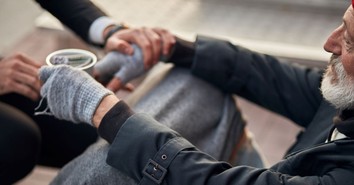The Life, Legacy, and Controversies of Pat Robertson
Influential minister, broadcaster, and politician Pat Robertson passed away Thursday at the age of ninety-three. As of this writing, no cause of death has been given, but he is survived by his four children, fourteen grandchildren, and twenty-four great-grandchildren.
Robertson is best known for his roles on The 700 Club and his political involvement, which continues to shape the relationship between evangelical Christians and the Republican party. In his later years, Robertson tried to focus more on the gospel than other issues, telling Fox News in 2021 that "God is not a Republican" and that he felt led to focus on "eternal matters and not secular politics" at that point in his life. However, politics remain an important part of his legacy.
Given his family history, though, perhaps that should not come as a surprise.
How Pat Robertson’s life led to The 700 Club
Pat Robertson was born on March 22, 1930, and his given name was Marion Gordon Robertson—the moniker of “Pat” came from his brother. His father served in Congress for thirty-six years as a representative from Virginia in the House and Senate while, on his mother’s side, he was related to both William Henry Harrison and Benjamin Harrison, respectively the ninth and twenty-third presidents of the United States.
Robertson went to military school as a child and served with the Marines in the Korean War, though he never saw combat, with some speculating that his father’s influence ensured that he never got too close to the fighting. After the military, he attended Yale Law School, where he did well but failed to pass the bar exam after graduation. While there, though, he met his eventual wife, Dede, who was a nursing student at the time.
Pat spent much of the early years of their marriage in clubs and gambling until an encounter with a traveling evangelist led him to Christ. Shortly thereafter, he went to seminary and graduated with a Master of Divinity in 1959.
While living in a rundown parsonage next to a brothel, Robertson purchased an old, off-air UHF television station in Portsmouth, Virginia, and moved his family there in order to start the Christian Broadcasting Network (CBN). Their first show aired on October 1, 1961, as WYAH-TV, an homage to the name of Yahweh. However, the station took off when, five years later, he started The 700 Club.
Over the following decades, both the show and the station rose in prominence, and the influence of Robertson—who served as The 700 Club‘s primary host—rose along with it.
"The most influential figure in American politics" in the 1990s
By the 1970s, Robertson was interviewing global figures like Israeli Prime Minister Yitzhak Rabin, as well as future presidents like Jimmy Carter and Ronald Reagan. That pivot into the political sphere would intensify when Reagan became president and culminated in Robertson making a run at the Republican nomination in the 1988 election.
While most discounted his chances in that race, he finished second in the Iowa caucuses, ahead of then vice president and eventual nominee George H. W. Bush.
Bush eventually pulled ahead and secured both the nomination and the presidency. However, the experience gave Robertson the legitimacy and clout to secure the Christian Coalition, which he started in 1987 to support his campaign, and which gave him a prominent seat at the table of Republican politics throughout the 1990s and beyond. As William Martin said of Robertson’s campaign, “Christians really became mobilized. They had a cause now, they had a champion who was speaking to their pain, speaking to their hearts and was willing to speak out loud.”
That influence reached its peak in 1994 when “it helped to elect the first Republican Congress in decades,” and did so with “a budget of around $25 million and a membership of four million or more.” By the time Robertson stepped down as the Coalition’s leader in 2001, a case could be made that he was “the most influential figure in American politics in the past decade.”
After leaving the Coalition, he continued his work with CBN before entrusting its management to his son, Gordon, in 2007. He remained the primary host of The 700 Club until 2021 when, as part of CBN’s sixtieth-anniversary celebration, he announced that he would turn that responsibility over to Gordon as well. But despite the reduced involvement, Pat continued to be a prominent guest on the program throughout his final years.
When legacies have controversies
Pat Robertson’s influence on the development of evangelical Christianity in America and its relationship to politics is undeniable. However, that influence did not come without controversy. And that controversy points to an important lesson we would all do well to remember today.
Anyone who spends the better part of sixty years as the host of a daily television program is going to say some things that are wrong. Robertson was no exception.
Among the most egregious was his agreement with Jerry Falwell’s statements that 9/11 happened, at least in part, because Americans had grown more accepting of homosexuality, abortion, and a host of other unbiblical positions. Blaming the earthquake that devastated much of Haiti in 2010 on a pact previous generations made with the devil and promising that “God himself” would intervene to keep former President Trump in office following the 2020 election are other examples of false and defamatory claims about God and his purposes.
There were more instances as well. And, while Robertson often walked those statements back in the aftermath, spoken words can never be fully retracted. Those controversies are as much a part of his legacy as the people he helped and the ministries he started. They do not, however, define that legacy.
And the same is true for us as well.
It can be tempting, at times, to compound our mistakes by giving them too much weight and allowing them to diminish the effectiveness of our lives for God’s purposes. That’s not to minimize the consequences of our faults or excuse the severity of sin, but we sin again when we allow guilt over past mistakes to keep us from fully experiencing God’s redemption when it takes place.
So repent when you know you’ve acted or spoken in error, but don’t allow regrets or sins of the past to determine what God can do with your present and future.
He sees more in you than your worst moments and wants to help you do the same.
Will you let him?
NOTE: Are you a pastor or church leader? If so, we’ve compiled research on Gen Z that may help you in leading your church. Visit DenisonForum.org/GenZ to download this free Gen Z resource by signing up for A Pastor’s View, our weekly email of encouragement for pastors and church leaders.
Publication date: June 9, 2023
Photo courtesy: ©Getty Images/Win McNamee/Staff
Ryan Denison, PhD, is the Senior Editor for Theology at Denison Forum. Ryan writes The Daily Article every Friday and contributes writing and research to many of the ministry’s productions. He holds a PhD in church history from BH Carroll Theological Institute after having earned his MDiv at Truett Seminary. He’s authored The Path to Purpose, What Are My Spiritual Gifts?, How to Bless God by Blessing Others, 7 Deadly Sins, and has contributed writing or research to every Denison Forum book.
The views expressed in this commentary do not necessarily reflect those of CrosswalkHeadlines.
For more from the Denison Forum, please visit www.denisonforum.org.
The Daily Article Podcast is Here!







